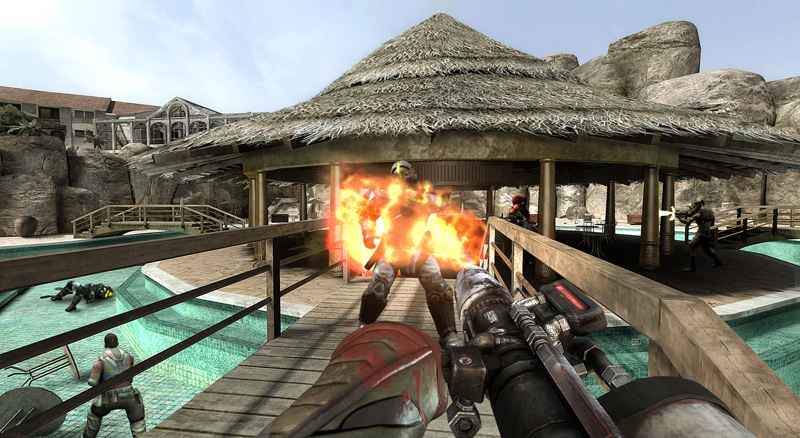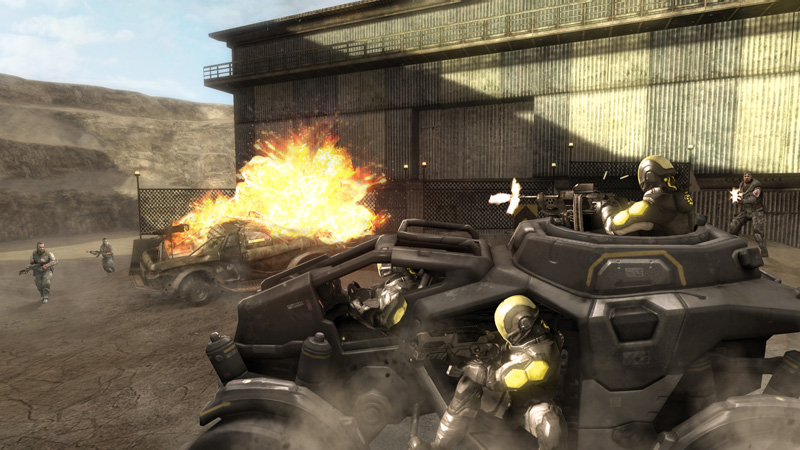Haze attempts to deal with the concept of wartime propaganda and how troop morale is the most important thing an army can have. But it does it in such a blatant way that it’s hard to care about the point the game’s story is trying to make. Tack on a short campaign, dull weapons, lame enemy artificial intelligence, and lackluster multiplayer options and you’re left with a game that occasionally looks nice, but not much else.

The game opens with a brief setup monologue from its protagonist, Shane Carpenter. Carpenter is a sergeant in the employ of the Mantel Corporation, some sort of futuristic government-like entity. You, with the rest of the Mantel forces, are in a South American region to fight against a dictator that your side has nicknamed Skin Coat because of his apparent proclivities for skinning and eating people. So you’re saving lives, right? The rest of your troop seems to think so. Right away, you’re introduced to a Mantel squad, a group of meat-headed soldiers who flip between talking about the great thing they’re doing for the people of this country, giving each other high fives, and generally bro’ing out.
Now, that’s not that different than the sort of macho stereotypes you’ve come to expect from these sorts of in-game situations. The difference is that these guys are jacked up on future drugs! The drug of choice for the Mantel guys is called Nectar, and when you’re on it, you can move faster, shoot straighter, and generally avoid thinking about the horrors of war. It’s built into the suits of the troopers and fed out at a constant rate by their leaders. The game quickly lets you know that the Mantel forces are all, essentially, a bunch of junkies–even if the game’s often-inaccurate subtitles claim that the characters are really calling each other “jacknecks” instead of “junkies.” Either way, right off the bat you get the impression that you’re on the wrong side of the conflict, and just like the back of the box and every single piece of pre-release hype that Ubisoft has produced says, you switch sides pretty quickly.
When you finally enter combat after a lengthy intro, you’re thrown into a mostly-competent first-person shooter without a lot of weapon variety and few special features specific to which faction you’re currently fighting for. As a Mantel trooper, you get the ability to juice yourself up with Nectar. When you do, all the enemies start to glow, making them a little easier to pick out. You recover health more quickly, move a bit faster, and while the game claims you’ll be more accurate with your shots, I wasn’t really having any trouble in that department to begin with. The danger is that if you hold down the drug button too long, you’ll overdose and your gun will start to shoot all by itself and you’ll generally freak out for a few seconds.
By comparison, the rebel fighters of the Promise Hand don’t use Nectar, but they have an ability that exploits the weaknesses of the drug. Apparently Nectar is designed to prevent users from seeing the horrors of war… like dead bodies. So the main skill you have is playing dead, which you can do whenever you take any damage with no penalty as to how often you can use it. This sort of makes you invincible, provided you play dead long enough for the enemy to spread out. You can also dive by double-tapping jump, but this never seemed useful. You can also steal weapons from enemies, but aside from the one time that the game forces you to do it and sets everything up perfectly for you to do so, there’s no need to do that. There’s plenty of ammo around.
Ammo’s rarely an issue because there are only a few different types of guns out there. You start out with an assault rifle and you occasionally encounter enemies wielding flamethrowers, shotguns, or rockets. But, if I had to make some kind of ballpark estimate, I’d say 90 percent of the enemies you fight have a standard assault rifle. Five percent have a shotgun, and the remaining five gives you the occasional flamethrower or other weapon. So the assault rifle you start with is the same assault rifle you’ll probably use at the game’s anti-climactic final confrontation. It took me around five hours to play through from start to finish on the game’s default difficulty. On the higher settings, you take more damage from enemy shots and seem to deal a little less damage with your own.

In addition to playing alone, you can play the campaign in co-op mode with up to three additional players online. The game doesn’t adjust any of the cutscenes when you play this way, so everyone is Shane Carpenter. This makes the whole mode feel thrown together, as do the occasional bugs, like seeing other players seemingly hovering in mid-air. There’s also a more traditional 16-player multiplayer mode, but with three basic modes (deathmatch, team deathmatch, and assault) and six maps (with small and large configurations), there’s not much to see here. The multiplayer plays off of the strengths and weaknesses of the two sides, so rebels can play dead and confound Mantel troops, which seems way more powerful than the minimal bonuses that Nectar confers.
Visually, parts of Haze look good. The game does jungle pretty well, though you won’t be ripping apart the foliage with gunfire and grenades or anything like that. Once you get into town or other areas, the game sports some textures that look pretty ugly up close. The audio is filled with speech from the other troops on the field, though they all repeat themselves very frequently, which makes it a very grating experience. For what it’s worth, I don’t think I heard the Korn song that seems to be getting more press than the game it’s based on once. I was surprised that it didn’t play over the end credits. Instead, the game has a collection of typical action game music during the campaign. In multiplayer, the game likes to loop a bunch of embarrassingly-rote hip-hop over the menus, the gameplay, everything. Hearing one song over and over for 20 minutes just seems like a bug, straight-up.
Playing Haze left me disappointed, for sure, but it also left me extremely curious about its development. Free Radical, the developers of Haze, have done better in the past in almost every single way possible, from weapons, to levels, to bot intelligence. Though it was announced just over two years ago, the end result plays like something that was slapped together and shipped after a year or so, rather than something that was painstakingly developed and refined. While there’s nothing about Haze that’s out-and-out broken or completely terrible, it doesn’t come close to meeting the expectations that today’s first-person shooter market creates.